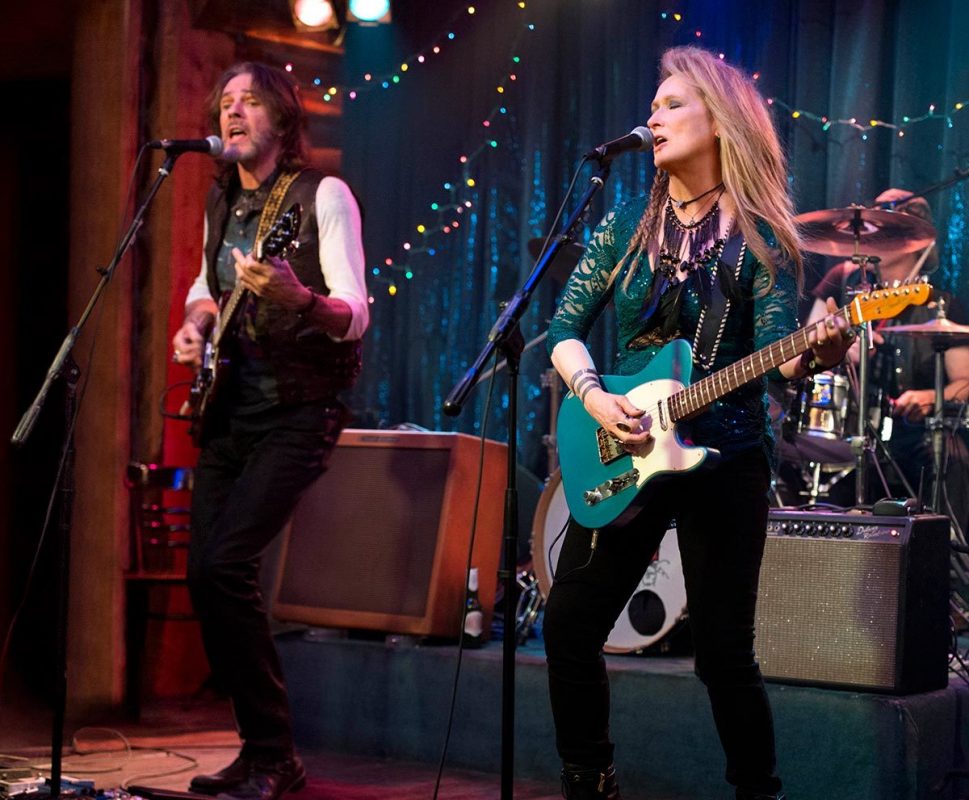
You’d have to be a crazy person to doubt Meryl Streep, but I have to
admit that a small part of me wasn’t sure she could pull off “boozy
singer with an American flag tattoo on her back who fronts a cover band
at an divey L.A. bar”. Not that she couldn’t imitate the mannerisms of
seasoned she-rockers like Bonnie Raitt or Melissa Etheridge, or that her
vocals wouldn’t be good enough (I knew from Mamma Mia that she could sing—at least well enough to let her acting make up for the deficiencies)—but could she seem sufficiently lived-in? Could
she convince us that she feels at home on that stage? That those
leather pants, motorcycle boots, and braids aren’t just a costume, but
an expression of her authentic self?
Of course she could. She’s Meryl “bleepin’” Streep.
She
plays the self-dubbed Ricki Rendazzo (née Linda Brummel), who left her
husband Pete (Kevin Kline) and her teenage kids to chase a rock and roll
dream. She put out one album, which didn’t go anywhere, but the dream
never really died. And some ten years later, she has a band—The
Flash—and a lead guitar player (Rick Springfield) she’s occasionally
sleeping with, and that regular gig at the watering hole, which she
supplements by working as a cashier at “Total Foods”. And even if she’s
living paycheck to paycheck, she’s still happy in her own way,
especially since she’s convinced herself that it’s not her fault she
never sees her grown kids because it’s them who want nothing to do with
her.
Everything changes when Pete calls to tell her that their
daughter Julie (Mamie Gummer, Meryl’s real-life daughter, in a juicy
part) has been dumped by her husband and has spiraled into a deep
depression. Although she’s flat broke, Ricki flies out to Indianapolis
in a last-ditch attempt to be there for Julie and reconnect with her two
sons, both of whom have surprises: Joshua (Sebastian Stan) is engaged
to a woman Ricki has never met and Adam (Nick Westrate), has been
proudly out of the closet for years.
One thing I liked about
the script: I’ve never seen a film where a parent was actually afraid of
her own children, but Ricki feels so disconnected from her kids, and
perhaps so guilty for abandoning them, she dreads seeing them.
“My kids hate me,” she groans to Springfield’s Greg at one point.
“It’s not your kids’ job to love you,” says Greg, who is prone to spouting earthy wisdom. “It’s your job to love them.”
Springfield,
it should be noted, holds his own against Meryl, even if his character
is a bit too romanticized to be believed. And he’s an almost
preternaturally young-looking 65, still handsome and fit enough to strut
around on stage in an open leather vest. (Eat your heart out, Jessie’s girl, wherever you may be.)
Ricki and the Flash was written by Diablo Cody (Juno) and directed by Jonathan Demme (Silence of the Lambs)
and it merges their sensibilities, to (mostly) winning effect. As is
often the case in Cody’s films, our hero sees the pursuit of coolness—in
this case, rock and roll—as being in conflict with family life. But
Cody has always been a little conservative
and her films tend to suggest that being cool is rarely as fulfilling
as—or at least not incompatible with—the love and comfort of family.
That being said, Ricki does make a slightly drunken, but trenchant
speech where she argues that women who leave their children are branded
as social monsters, whereas rockers like Mick Jagger—who has multiple
children with several different women—are applauded as rascals and rebels.
As for Demme, his love of music—he directed the great Talking Heads concert film Stop Making Sense, as well as a few rock
documentaries— is evident throughout. There are several scenes of Ricki
performing with the Flash and while there’s often some bit of
interpersonal drama playing out on stage, sometimes the music is simply
there to be enjoyed. A scene where Ricki gets high with Pete and Julie
showcases the director’s knack for creating loose, warm, and intimate
interactions among family members, as he did so well in Rachel Getting Married.
Ricki and the Flash
is not a great film—it’s prone to corniness, like a final scene where
uptight squares let down their hair and rock out that wouldn’t feel out
of place in Dirty Dancing—but it’s a highly entertaining one. Kline is his usual reliable self as the solid guy who loves his wife, but still holds a bit of a torch for his ex. And Streep makes us care about Ricki even when she’s being a stubborn jerk. It’s another astonishing performance by her, in a film just good enough to deserve it.
